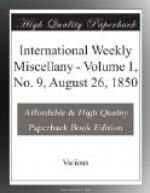* * * * *
Mr. Burt has nearly finished the “Anne Page and Slender” of Leslie, which is to be the annual engraving of the Art Union. It will be an admirable picture, but we cannot but regret that the managers selected for this purpose a work so familiar.
* * * * *
The French Minister of the Interior has decided that marble busts of M. Gay-Lussac and of M. Blainville shall be executed at the expense of the government, and placed in the Institute.
* * * * *
Mr. Powell, who is living in Paris, engaged upon his picture for the capital, has been in ill health nearly all the summer.
* * * * *
RECENT DEATHS.
* * * * *
The French papers report the death, at Paris, of M. MORA, the Mexican Minister Plenipotentiary at the Court of St. James. M. Mora was the author of a History of Mexico and its Revolutions since the establishment of its independence, and editor-in-chief of several journals in Mexico.
* * * * *
MR. B. SIMMONS, an amiable and accomplished writer, whose name will be recollected as that of a frequent contributor of lyrical poems of a high order to Blackwood’s Magazine, and to several of the Annuals, died in London on the 20th of July.
* * * * *
[FROM GRAHAM’S MAGAZINE.]
ON A PORTRAIT OF CROMWELL.
BY JAMES T. FIELD.
“Paint me as I am,” said Cromwell,
Rough with age, and gashed
with wars—
“Show my visage as you find it—
Less than truth my soul abhors!”
This was he whose mustering phalanx
Swept the foe at Marston Moor;
This was he whose arm uplifted
From the dust the fainting
poor.
God had made his face uncomely—
“Paint me as I am,”
he said.
So he lives upon the canvas
Whom they chronicled as dead!
Simple justice he requested
At the artist’s glowing
hands,
“Simple justice!” from his
ashes
Cries a voice that still commands.
And, behold! the page of History,
Centuries dark with Cromwell’s
name,
Shines to-day with thrilling luster
From the light of Cromwell’s
fame!
* * * * *
[FROM THE EXAMINER.]
WORDSWORTH’S POSTHUMOUS POEM.[3]
This is a voice that speaks to us across a gulf of nearly fifty years. A few months ago Wordsworth was taken from us at the ripe age of fourscore, yet here we have him addressing the public, as for the first time, with all the fervor, the unworn freshness, the hopeful confidence of thirty. We are carried back to the period when Coleridge, Byron, Scott, Rogers, and Moore were in their youthful prime. We live




